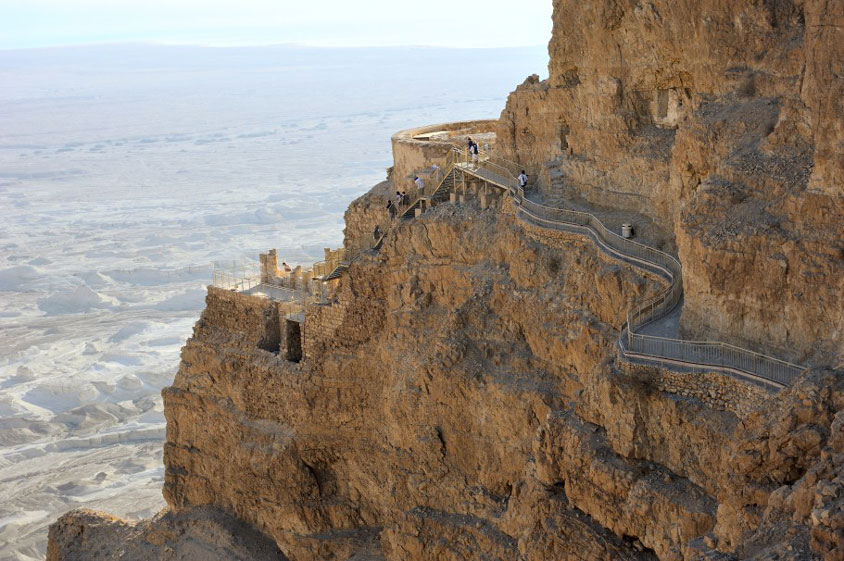Rising 1300 feet above the western shores of the Dead Sea are the remains of the ancient Jewish fortress of Masada. Masada stands in majestic beauty and splendid isolation in an area that is one of the most desolate on earth. Built by Herod the Great between 37 and 31 BC, Masada was a lavish and self-contained mountaintop refuge for the ruler, built as a safeguard in the event of a revolt against him.
Masada was not only self-contained with a perpetual water supply and storehouse filled with grain; it was also virtually impenetrable. One small and narrow snake path weaving back and forth along the eastern side of the mountain provided the only means of access. Forced to climb this steep path single-file, any attacking army would be easily defeated by the soldiers above.
Located on the eastern edge of the Judean Desert, people from across the globe come to visit Masada and tour this magnificent feat of ancient innovation. It is the most visited historic site in all of Israel. However, it is not only the innovation and archeology that draw people to Masada. It is also the site of one of the most dramatic episodes in history.
Nineteen centuries ago, a group of freedom fighters, called Zealots, decided to kill themselves on top of Mount Masada rather than submit to the oppressive yoke of Roman slavery.
The story of the siege of Masada and the apparent suicide of its inhabitants is deeply ingrained in Jewish tradition. The Zealots did not kill themselves because they were afraid or hopeless, nor hungry nor thirsty – they believed it was God’s will that they die bravely, and more importantly, that they die as free men, women, and children.
Josephus Flavius, the ancient historian, records that what took place on Masada was not strictly suicide because Judaism forbids suicide; instead, the people atop Masada drew lots, killing one another in turn, until only one man remained, leaving him to fall on his own sword.
For many, the story of Masada and the Zealots’ resolve to resist being taken as prisoners by the Romans and their courage to choose death over slavery, symbolize Jewish heroism and strength; not only their last fatal decision, but also the fact that the 960 inhabitants of Masada managed to hold off the 15,000 men of the Roman Legion X for nearly three years.
Masada’s defenders, who, in 70 AD witnessed the destruction of the Temple in Jerusalem during the four year full-scale revolt by the Jewish people against the Romans, evaded capture after the fall of Jerusalem. Led by Eleazar ben Ya’ir, the remaining Zealots took refuge on the mountaintop fortress of Masada.
For two years, control of Masada went unchallenged. Then, in 72 CE, the Roman Legion X, under the command of Lucius Flavius Silva, the Roman governor of Judea, laid siege to Masada to bring an end to the Jewish revolt. The Romans built a fortification wall around the entire mountain, so no one could escape. The remains of the Roman wall and encampments can still be seen today.
After considering all their options, the Romans decided to build a siege ramp up the western face of Masada. The Romans strategically used enslaved Jews to construct the ramp, knowing that the Jewish Zealots atop the mountain would not kill their fellow brothers. The ramp took nearly three months to complete, as the people on top of Masada watched and waited. In the spring of 73 CE, the ramp was finished and on April 16, the Romans breached the walls of Masada.
As Eleazar ben Ya’ir realized the end was near, he met with his followers and entreated them to be true to the cause that had brought them to this moment. He declared, “Let us rather die than be enslaved by our enemy. Let us leave this world in freedom.”
At long last, when the Romans entered the fortress to overtake the Zealots, they found 960 Jewish men, women and children had died by their own hands: the men embraced their wives and children as they put them to the sword; then, lots were cast, and ten men were chosen to take the lives of the remaining men; finally, the last survivor set fire to the palace and fell upon his own sword. Purposefully, the defenders left behind full and abundantly well-supplied storehouses for food and cisterns for water, a message for the Romans that they had chosen death over slavery.
For many generations, it was believed that the story of Masada was just a legend. But in 1963, Professor Yigal Yadin led the excavation of this memorable site and proved the legend to be history. Masada has become the symbol of the determination of the Jewish people to be free in their own land. After two thousand years, the sacrifice made on Masada remains a heartfelt reminder of the commitment and exorbitant cost freedom often requires. Masada is a site not to be missed on any trip to Israel.















